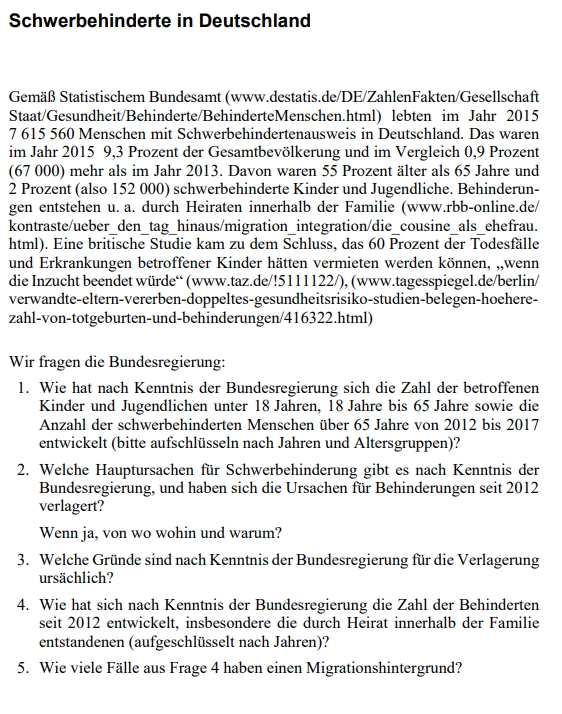A small request from the AfD in the Bundestag about the demographic development of people with special needs is currently being widely distributed on Facebook.
Screenshots and *.pdf documents are currently circulating in social forums regarding a small query from the Alternative for Germany (AfD), in which they would like the Bundestag administration to answer how the number of people with special needs (disabilities) has developed. At least it gives the impression that the data being requested is purely demographic (i.e. population development).

First of all: the request was actually submitted and can be found on the federal government's servers under the following link: Bundestag
Content classification
The first part of the query is purely statistical, which you could have answered yourself with the help of the Federal Statistical Office. The data is freely accessible to everyone in the DeStatis database and you stated that yourself in the introduction. Question 1 would therefore be obsolete, but should form the basis for the following questions. The follow-up questions are about the causes of the disabilities (genetic, due to accident, treatment errors, etc.). But above all, how the causes have changed over the long term.
The causes of disabilities are as diverse as the population as a whole. In the event of accidents, each individual case would have to be specifically investigated and precautions taken so that these accidents could no longer happen. However, this would entail a restriction of the freedoms of every single person. Accidents at work are generally investigated by the municipal accident insurance company and its employees and appropriate measures are taken to prevent these same causes of accidents in the future.
Some genetic changes can be predicted medically, but the decision as to whether a child is born does not have to be made by politicians, but only by the expectant parents.
Back to the small request:
The fourth question explicitly wants to find out about impairments caused by incest, question 5 then differentiates even more and wants to know the number of incest cases in families with migration experience. Point 5 specifically asks for an answer as to how high the proportion of incest-related disabilities is in migrant families.
The sixth question then seeks to compare how many people with special needs have migration experience.
Classification from a social science perspective
The statistical data are initially only quantitative results; the number of people with special needs says nothing about the qualitative significance. There is a possibility that it is
a) there are more people with special needs than before, as support and inclusion options have been expanded in rural regions in recent years,
b) there are fewer people with special needs than before, as diagnostic options have improved and expectant parents are more likely to decided to have abortions,
c) there are more people with special needs than before because the diagnostic options became better and the expectant parents knew what to expect,
d) the number of people with special needs increased because people's attitudes and values changed have changed,
e) there is an overall increase in the number of people with special needs, as the population development has also changed positively upwards and it is therefore a steady increase.
To what extent this request represents added value for society cannot be said at this point. Research in medicine is in full swing regardless of the request and medical progress cannot be changed by a political proposal in the Bundestag.
Looking ahead, it remains to be hoped that this inquiry about disabilities and incest will not raise follow-up questions regarding race and (eu)genetics, but that people will be allowed to continue to be what they are: people. No matter what skin color, gender, origin or or or.
Notes:
1) This content reflects the current state of affairs at the time of publication. The reproduction of individual images, screenshots, embeds or video sequences serves to discuss the topic. 2) Individual contributions were created through the use of machine assistance and were carefully checked by the Mimikama editorial team before publication. ( Reason )

